Topic: Historic Hollywood
Landmarks: The Forgotten Major Studio
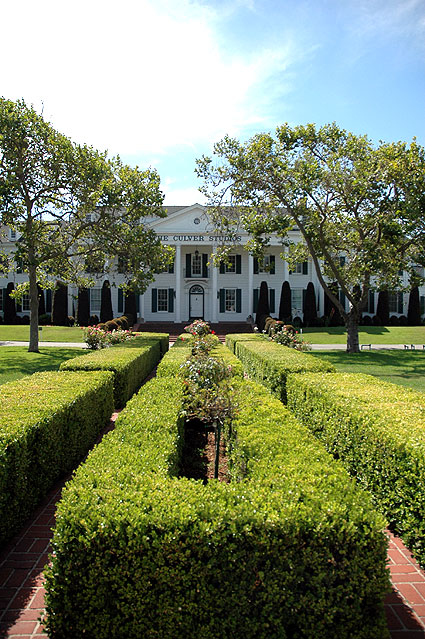
The forgotten major studio would be Culver Studios, in Culver City, a few miles southwest of Hollywood in the flats.
Okay, almost a hundred years ago, Harry Culver, the founding father of Culver City, decided he had to meet Thomas Ince, the father of the westerns - Culver had seen Ince directing one of his westerns in nearby La Ballona Creek. Culver was building a city after all - he'd moved to California in 1910 and learned the real estate business from I. N. Van Nuys - and wanted this new movie business in his new town. The Articles of Incorporation for Culver City were filed with the California Secretary of State on September 20, 1917, but the place was already booming. Culver convinced Ince to move his studio operations from Florida to Culver City and in 1915 the first Culver City studio was under construction - Ince/Triangle Studios. Ince added a few stages and an administration building but sold out his share in the business to his partners D. W. Griffith and Mack Sennett, and relocated down the street and built what you see here as The Culver Studios. Harry Culver leased the land to him. Of course by 1918 Triangle Studios itself was up for sale - and Samuel Goldwyn bought the place. In 1924, Marcus Loew orchestrated the merger of three motion picture companies - The Metro Pictures Corporation, Goldwyn Studios and Louis B. Mayer Productions to form Metro-Goldwyn-Mayer. Things were a bit turbulent back in the silent movie days. MGM, down the street, is famous of course (photos here and a good history here). That's now Sony-Columbia. It's all very fluid. What used to be MGM gets all the tourists. It's legendary.
The city has more on Culver Studios, which isn't quite as famous, here - it took two years to build the Thomas H. Ince Studio at 9336 Washington Boulevard, with its Mount Vernon mansion - a December 1, 1918 Los Angeles newspaper called it a "motion picture plant that looks like a beautiful Southern estate." The studio was planned by Meyer and Holler of the Milwaukee Building Company, the same firm that created two of the historic theaters on Hollywood Boulevard, the Chinese Theater (1927) and the Egyptian (1922).
And you have to love this detail -
What a way to go, on the Hearst yacht. Cecil B. De Mille soon made "King of Kings" here - the first movie shown at the Grauman's Chinese Theatre. In 1940, RKO made Citizen Kane here, all about William Randolph Hearst. Very odd.Ince, a visionary in the industry, and actor turned producer, promoted the glamour of moviemaking with a reverence. He entertained the King and Queen of Belgium, and President Woodrow Wilson. The administration building became a well-known landmark, and Ince was rapidly expanding his successful facility. In the early days, the studio fire chief also acted as the city fire chief. But in November of 1924, amidst clouded circumstances, Thomas Harper Ince fell ill on William Randolph Hearst's yacht, and reportedly died of a heart attack at home within the week. His wife Elinor K. Ince, once a talent agent, took the reins until the next year, when it became De Mille Studios.
The studio itself has a website with its own history - Gone With The Wind was shot on Stages 11 and 12 in 1939, and all the exteriors of Tara, Twelve Oaks and the city of Atlanta were created on the back lot and torched for the filming of the burning of Atlanta sequence in the film. But the mansion isn't Tara.
And this -
That would be President Kennedy's father, later our ambassador to England. The son had that thing with Marilyn Monroe. Make of it what you will.Going back in time to just after Thomas Ince died, the studio was purchased by Cecil B. DeMille who built monumental sets on the back lot. The most impressive were replicas of the streets of Jerusalem for one of his biggest budgeted features The King of Kings in 1927. These sets were used in many movies over the years. They were seen in King Kong as part of Skull's Island in 1933. These sets towered over the studio for a dozen years until they were burned to the ground for Gone With the Wind in 1939.
RKO acquired the studios in 1928 and Joseph Kennedy served as one of the studio heads. It was during his tenure here that he had his infamous love affair with leading lady Gloria Swanson. Legend has it that Kennedy built her a private dressing room as a gift. Only much later and after the affair ended did Swanson discover Kennedy had used her money to pay for it. The bungalow still stands and is used as an office for writer/producers.
RKO controlled the lot for almost thirty years - the days of Bette Davis, Robert Mitchum, Cary Grant, Katherine Hepburn, King Kong, Fred Astaire and Ginger Rogers. So think A Star Is Born (1937), Tom Sawyer (1938), Alfred Hitchcock's Rebecca (1940) and Spellbound (1945). And Citizen Kane was shot on the lot in 1940. Howard Hughes bought the place in the fifties and ran it into the ground. Desilu Productions purchased the lot in 1956 and television became the main business - The Andy Griffith Show, Hogan's Heroes, The Untouchables, The Adventures of Ozzie and Harriet, Lassie and Gomer Pyle - and in 1967 Peyton Place, as well as The Green Hornet, Batman and the pilot for Star Trek. Star Trek became a Paramount franchise and moved down to Melrose Avenue.
In 1968 new owners sold off most of the back lot and by the late seventies the place was pretty much abandoned. In 1977, the studio became Laird International Studios, a rental facility. When Laird filed Chapter 11 in 1986, Grant Tinker (Mary Tyler Moore's producer and husband) and Gannett (USA Today), bought the place and called it GTG Entertainment, then The Culver Studios. In 1991 it became a part of Sony Pictures Entertainment. Sony sold the studio to Pacific Coast Capital Partners (PCCP) Studio City Los Angeles in 2004. Sony had too much television production space.
So that's it, but as the studio's site notes -
Baywatch? Ouch.Walk through any of the restored buildings and there is a feeling of another era. Over the years, unsubstantiated rumors of studio hauntings have circulated among the studio staff. Stage hands high in the catwalks have reportedly been confronted by a ghostly figure resembling Thomas Ince. It's rumored that late at night a spirit - some say Gloria Swanson - roams the halls of the mansion. While there is no proof of these sightings, eerily similar reports occur year after year.
Many recording artists have utilized the studio's private atmosphere to rehearse (Eagles, Fleetwood Mac, Don Henley, Janet Jackson) and to shoot music videos (Ricky Martin, Madonna, Michael Jackson, Luis Miguel). The Culver Studios is also the birthplace of Baywatch, Mad About You, and The Nanny.
The studio is not open to the public, and no tours are offered.
But there are the stories, like this from the days when Louis B. Mayer's son-in-law, the Pittsburgh-born RKO executive David O. Selznick, ran the place -
Amusing.They even staged the famous "burning of Atlanta" scene from "Gone With The Wind" here on the back lot of Culver Studios, on December 10, 1938. The city of "Atlanta" was actually made up of various old sets from previous films made on the lot, which David O. Selznick set ablaze to make room for the construction of the exterior of Tara. (The fire consumed old sets from "King Kong," "The Last of the Mohicans" and "Little Lord Fauntleroy.") Yet the key role of Scarlett O'Hara still had not been cast. As Selznick watched from atop an observation tower as the red flames consumed "Atlanta," his brother Myron introduced him to Vivien Leigh, with the words: "I'd like you to meet your Scarlett O'Hara."
Lucille Ball was one of the many actresses who tried out, unsuccessfully, for the part of Scarlett in "Gone With the Wind." She got her revenge later, though, when she bought the studio, turned it into her own Desilu Studios, and took David O. Selznick's office as her own. (Desilu later moved to what is now part of the Paramount lot.)
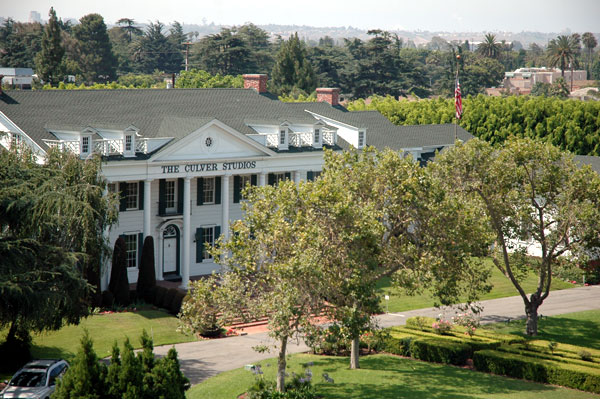
The working end of things -
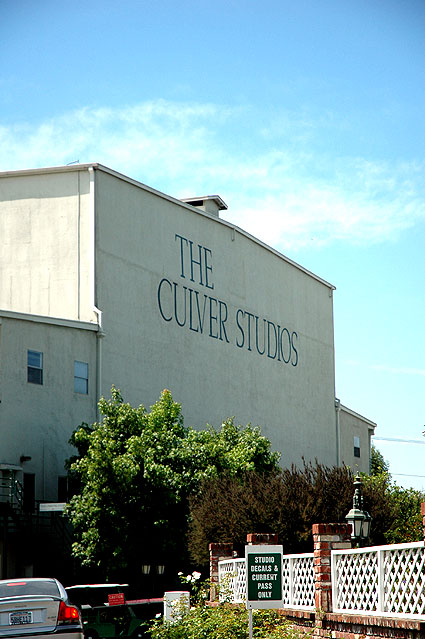
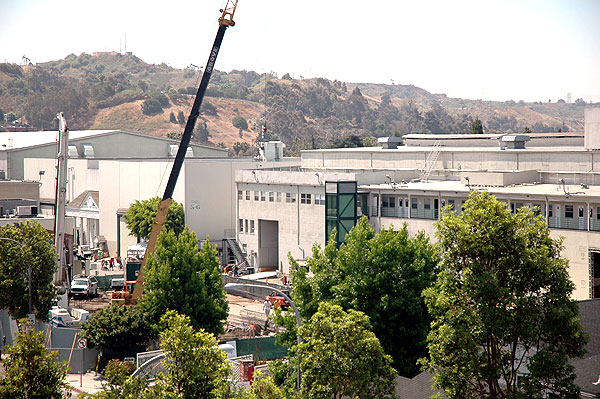
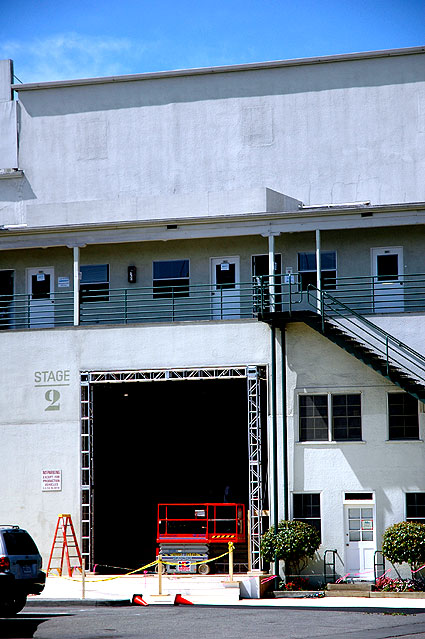
Nearby, the new De L'Esprie bronze of Harry Culver, dedicated March 26, 2006 -
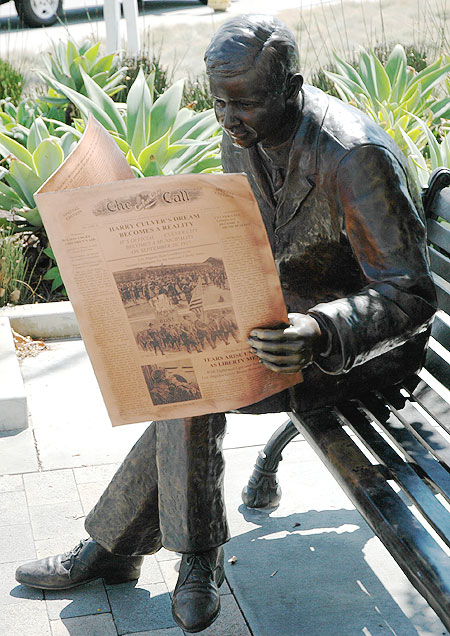
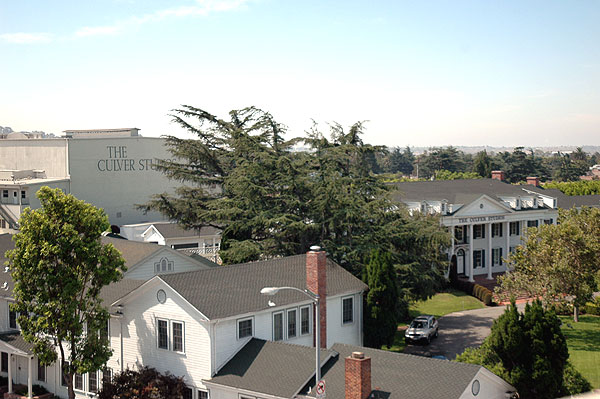
Posted by Alan
at 5:39 PM PDT
|
Post Comment |
Permalink
home
Updated: Friday, 30 June 2006 5:47 PM PDT
home
Updated: Friday, 30 June 2006 5:47 PM PDT

